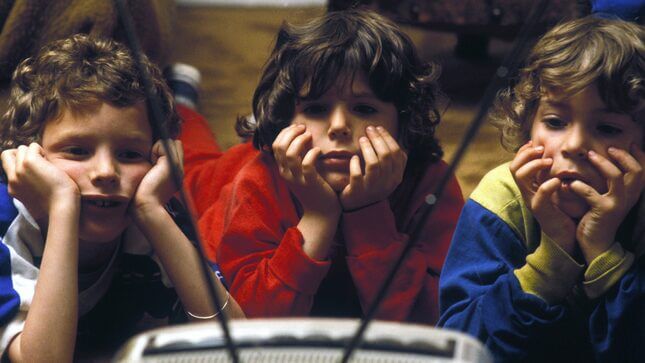Binge-Watching My Way Through Corporate America
Latest

Two years after graduating college, I was broke and living in San Francisco, the crown jewel of the United States’a most expensive cities. Food service jobs barely covered grocery bills and car payments and phone plans, so my roommates and I supplemented the cost of rent with a spectrum of odd jobs: operating photo booths at corporate events, selling our underwear to men on the internet, working as personal assistants to stay-at-home moms in Marin County. The need to fulfill my many dreams and survive as a human were in constant conflict.
One night, at a party somewhere in the shadow of the then newly-erected Salesforce Tower, a friend informed me that her workplace (which she excitedly claimed was “in fashion”) was hiring. Not exactly what I’d gone to school for, but the drought of artistic jobs in San Francisco afforded our desperate group of liberal arts graduates little option. I attended a job fair at a ramshackle warehouse the following week amidst racks of designer clothing and was hired on the spot. (Looking back, this urgency should have worried me.)
The job, if one could call it that, was simple. I was to sit at a desk beside a cluster of fellow 20-somethings and scroll through photos of the overpriced clothing we sold. Eventually I’d click a button and a new set of images would materialize before me. Scroll. Click. Scroll. Click. It was dull work that also offered more money than I’d ever made in my life ($15 an hour!) I’d also discovered that streaming sites weren’t blocked by our internet and used that unparalleled freedom to binge-watch the entirety of Desperate Housewives, Ugly Betty, One Piece, and The Good Wife. Sharing the “Airpods” I’d bought at an astronomical discount from eBay, my deskmate (who’d eventually become my husband) and I stifled our laughter when Julianna Marguiles would assertively strut between various courtrooms.
Who actually watches anything?
While I maintain it was fine, law abiding baby boomers like Robert De Niro would argue otherwise. Buried in a new lawsuit from his company Canal Productions is an allegation that former employee Chase Robinson—who the suit asserts misappropriated funds totaling $52,000—also watched 55 episodes of Friends, 20 episodes of Arrested Development and 10 episodes of Schitt’s Creek while in the office. Per Variety, the suit states:
“Watching shows on Netflix was not in any way part of or related to the duties and responsibilities of Robinson’s employment and, on information and belief, was done for her personal entertainment, amusement and pleasure at times when she was being paid to work,”
The woman in question, a former “vice president of production and finance,” is accused primarily of misappropriation of funds, including “$8,923.20 at Dean and Deluca and Whole Foods, and $32,000 for Ubers and taxis,” per Variety.
Our parents, who’d been introduced to the same technology much later in life, were ill-equipped to handle a generation of teens with unmitigated access to forums, Livejournal, and Myspace.
However, De Niro’s company bundling Robinson’s television viewing habits in the suit speaks to a larger technological divide between generations. By the end of my brief tenure in my aforementioned office job, every one of my coworkers had adopted the “Hulu and click” model I’d spearheaded. The work was a combination of mental labor (browsing our site’s wares for irregularities) and physical strain (long hours spent hunched over a computer.) Our cleared inventory amounted to the “production output” oft cited by the investors who’d loom over our shoulders once a month. If they were to be believed, no amount of Netflix would cause our numbers to dip. In fact, we were regularly touted as the “most productive” department in the warehouse. (How you gauge the efficacy of scrolling and clicking and hunching is beyond me, but I was also not paid to care.)
As more of my fellow Gen Z comrades enter the workforce, frustrations around this type of multitasking will increase tenfold. We were taught that study was best conducted in a quiet space with little distraction, but that isn’t the world we were raised in! My best work is done when the women of The View are loudly bickering in my living room, or a YouTube series on the history of public housing is rambling on from the corner of my computer screen. I like the noise. And besides—who actually watches anything. In the 40 hours it took me to plow through this summer’s Love Island, I probably spent 30 percent of the time looking at my television and the other 70 percent reading, napping, writing, or absentmindedly scrolling Los Angeles apartments on Craigslist. I do not know the woman who drew De Niro’s ire—and her age is a detail left out of the suit—but I’m comfortable with the guess that her work-related shortcomings had nothing to do with her proclivity for the ‘90s sitcoms our culture refuses to let go of.
After I left the job, our managers permanently blocked Netflix and Hulu, former coworkers later informed me. Without them, I would not have survived my brief stint in corporate America. I suspect the same is true for many of my age. The panic about my generation’s workplace habits reminds me of the era of superstition that plagued our adolescence around technology and home computers. Our parents, who’d been introduced to the same technology much later in life, were ill-equipped to handle a generation of teens with unmitigated access to forums, Livejournal, and Myspace.
Like the slow rise of the home computer or even the cell phone, the many ways we consume content are only becoming more ubiquitous. Workplaces can resist, or they can listen to us and adapt to our differing needs. History tells us they’ll likely resist.